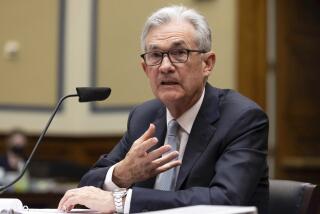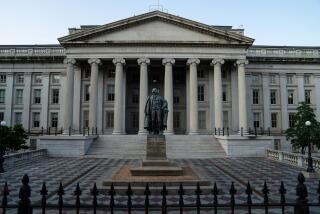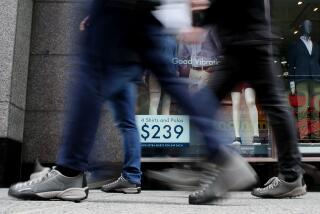Tax Cuts Wouldn’t Aid Economy, Official Says : Commerce: Robert Reischauer, director of the Congressional Budget Office, says they would be too late. Meanwhile, purchasing managers expect no ‘double dip.’
- Share via
WASHINGTON — The head of the Congressional Budget Office warned Tuesday that tax cuts probably would not strengthen the recovery, while the nation’s purchasing managers and a key Federal Reserve official indicated that a “double-dip” recession is unlikely next year.
In testimony before the House Budget Committee, CBO Director Robert Reischauer said cutting taxes to fight the economic downturn could reduce long-term prospects for growth because it would significantly increase the national deficit.
“Since the only measures likely to stimulate the economy in the short term are those that increase the deficit significantly, at least for awhile, there is a clear trade-off between short-term and long-term goals,” Reischauer said.
He warned that there is no “single bullet” capable of eliminating both the near-term and long-range problems facing the nation.
Noting that the Budget Enforcement Act of 1990 requires tax cuts to be offset by rising revenues or spending cuts, he added: “As a result of the offsetting tax increases or spending cuts, the short-term stimulative effects of such proposals are likely to be small at best, and could even turn out to be counterproductive.”
Under questioning, Reischauer said a middle-income tax cut being advocated by the House Democratic leadership and likely to be endorsed by the Administration would be “down at the bottom of the list of things I would consider” to boost the economy.
Actions by the Federal Reserve Board to reduce interest rates, Reischauer added, should begin taking effect in four to six months and will enhance the recovery.
Reischauer said he expected economic growth to be “anemic at best” for the next six months, followed by a recovery only half as strong as the usual bounce-back from a post-war recession.
But Reischauer said he believed that chances of a double-dip recession--another downturn in the economy--are “well below 50%, but it’s still a possibility.”
That was an assessment seconded by Federal Reserve Vice Chairman David Mullins.
In a speech Tuesday to the National Economists Club, Mullins said the economy was suffering from the excesses of the 1980s.
But he said it should be “back squarely in the positive growth area” by mid-1992, just in time to help President Bush’s bid for reelection.
The National Assn. of Purchasing Management, a trade group whose reports on the economy are closely watched, indicated in its semiannual forecast that three-quarters of members who were polled believed that the economy would grow at a slow pace in 1992 but avoid a “double-dip.”
“Although optimistic that a recession will not return, purchasers are expecting the economy to continue to recover at a slow pace during 1992,” said Robert Bretz, chairman of the group’s business survey committee.
The forecast, released at a news briefing, was based on a poll of executives who purchase raw materials and supplies for 300 major companies.
Times wire services contributed to this report.
More to Read
Get the L.A. Times Politics newsletter
Deeply reported insights into legislation, politics and policy from Sacramento, Washington and beyond. In your inbox three times per week.
You may occasionally receive promotional content from the Los Angeles Times.










